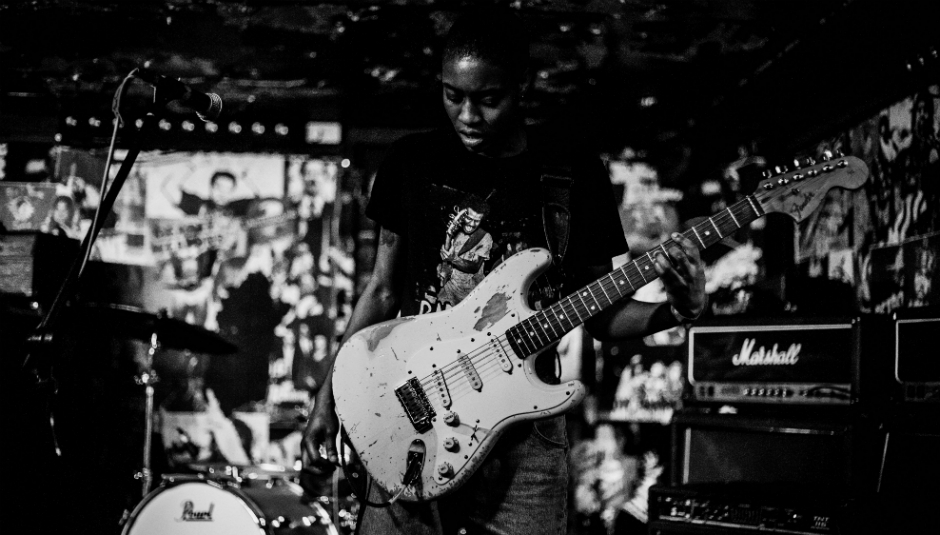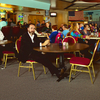To celebrate International Women’s Day 2017, we asked some of the leading women from the burgeoning underground DIY music scene here in the UK to interview each other about the issues that mattered to them in a conversation covering everything from casual sexism, gender-identity, their sense of self, taking control of their own careers, how to go about building a more inclusive community, and the people who have inspired or helped them along the way. We’ve also put together a playlist featuring the best of the women’s bands.
Phoebe Saunders (Harker): When I first started playing gigs I often found myself feeling intimidated or overwhelmed by other people assuming what I could or couldn’t do or what I knew in terms of the instruments I play, and to combat this I ended up building a lot of my own equipment. Jen, have you ever found yourself feeling like you need to question your own knowledge or had to work harder than your male peers for the same recognition or do you think attitudes are beginning to change?
Jen Hingley (False Advertising): That’s a sad thing to hear, but it holds true to me to some extent. In my experience, attitudes to my contribution to the band have varied massively. Generally I receive a lot more praise for my multi-instrumental role in the band than Chris, who also switches between guitar and drums. At first I did find this uncomfortable and unfair, but then I began to realise that a lot of these people are actually finding what I do inspiring because of my gender, as they’re not used to seeing it. On the flip side, of course, I’ve had sexist hecklers at gigs – the guy the other day who said I “would sound better naked” for example – and had people write reviews solely commenting on my femininity or my appearance. But weirdly I think it’s the drumming that shuts a lot of people up.
Laura – I’m really inspired by the DIY scale of your band and how much you’ve achieved with so little. From a band that has a similar ethos, I’m interested to ask how important you think it is for artists to communicate the fact what they’ve been able to achieve off their own backs. Do you think it encourages more people to do it themselves?
Laura Lee (Parachute For Gordo): Thanks! I think DIY is the core ethos of our band and we want that to encourage others to take chances and feel a freedom to make whatever they want. Films can now be produced on phones and recording equipment is now super affordable – it’s a really exciting time for DIY projects. You don't want to be limited by money to make music, you can be very creative with nothing but a little imagination. I knew on our new record Possibility Of Not that I wanted to be ambitious, but we managed to produce all of the record and videos ourselves, and it might mean it’s a bit rough around the edges, but hopefully we made something that’s authentic, passionate and representative of our music scene.
Jess, I've just listened to your track ‘Same Place’ and I was very pleasantly surprised to hear a Sleater-Kinney influence. It so happens that I am currently reading Carrie Brownstein's book Hunger Makes Me a Modern Girl. I think their magic was from being in a trio, something I identify with in my own band - how do Peaness feel about it?
Jess (Peaness): We totally agree. Three IS the magic number, after all. Being a three piece makes our relationships so honest and pure, it's something we talk about quite a bit. From the start, we wanted the spot light to be over all of us as a unit. In Peaness, myself and Balla share vocal responsibilities and we each have our separate moments to shine throughout different sections in different songs. Everything is so raw and somewhat fragile when it's just drums, bass, guitar as well – there are no other noises or drones to hide behind, nothing to mask a mistake, especially if you're writing structured pop songs as we do. It's that pressure that brings us (and the audience) so much excitement when it's flawless. We absolutely love the thrill.
Signe, we saw that Nelson Can run your own label in Denmark called Like A Can Of Beans Records, and release local upcoming talent. Another Danish band we all really like are Mew, who also run their own label – is this a common thing to do in Denmark for artists? What is it like managing a label and a band at the same time?
Signe Signe (Nelson Can): We decided to go back to basics and just do everything ourselves. It really strengthened us as a band and gave us the courage to just ‘do our thing’. I think it’s the future. We wanted to share the knowledge we have and help other bands get fair record deals and get their music out to a bigger crowd. There is a word in Danish called ‘fællesskab’ and the closest translations are ‘fellowship’ and ‘community’. Fællesskab is the key word for our label. The money that the label earns is invested in the bands who need funding and all our bands help each other out in that way. We also help promote each other and share gear and stuff like that. No one is bigger than their network, and it’s important to help each other out and just share the love. All bands stand on the shoulders of someone – someone who supported them at the right time or someone who just said the right thing or believed in them when they almost lost the faith themselves. So, Phoebe, who were those people for you, and how did it affect the way your musical career developed?
Phoebe Cross (Happy Accidents): I’m not sure there was a breakthrough moment, but rather a combination of lots of factors. My parents letting me have a drum kit when I was 12 and play it whenever I liked really started the whole thing off for me. Then there were lots of small chance moments like meeting my bandmates Rich and Neil at the right time. The Joiners, a venue in Southampton, definitely played a part by giving us our first shows. We’ve had a lot of support from all sorts of people and ultimately those coming to watch us who are fans of our music. Our label – shout out to Alcopop! – are so encouraging and the reaction from people at our shows certainly spurred me on when I doubted if we were good enough for ‘this music thing’. I never think of it as a career but at the moment it’s definitely a fun and challenging journey of sorts and maybe one day if I could call it a career that would be awesome!
Kaila, I loved Youth Man’s animated video for ‘Look/Wait’ where you get abducted by aliens, so my question is a fun one – if aliens actually abducted you and you were able to choose what modifications you got, what would you chose?
Kaila Whyte (Youth Man): I would have suction pads attached to my extremities. My mom hates my band but she loves Lionel Ritchie, so if she ever came to another show I could literally climb the walls and dance on the ceiling and she would love it. Also, it'd probably help stop me falling over all the time!
Em, my question for you – as a queer woman I think my local scene is bloody amazing because I feel it's a safe space for all different kinds of creative people. As a member of the LGBQT+ community, do you feel supported by the music scene where you're from?
Em Foster (Nervus): I live in Brighton now and the local scene here is amazing. Everyone from the bands to the venues and promoters make an effort to be inclusive and supportive of all different kinds of people. It’s also generally a safer place to be a trans woman. We played a show at Trans Pride in Brighton last year and I think that might have been one of our favourite shows we’ve ever done. I used to live in Watford, which doesn’t have a Trans Pride event unfortunately, but I think the scene there is really supportive too. The Watford scene pretty much revolves around The LP Cafe and Titan Studios who have both done a lot for Nervus, and I can only speak for myself but I am sure that support would extend to all LGBTQ+ musicians and people. Venn Records are also based out of Watford and were born of the Watford scene I grew up in. Lags from Gallows was in a band called My Dad Joe who used to play down the Rugby Club. If it wasn’t for Venn, Titan and The LP Cafe then Nervus wouldn’t exist!
Lucinda, I really love the Sad EP that Kamikaze Girls released last year. With the subject matter being so personal, do you ever find it difficult performing these songs each night on tour?
Lucinda Livingstone (Kamikaze Girls): At first I was a little worried. In all those years of writing songs I had never really written something so personal, and if I had it was probably drenched in artistic license. I was worried about what the people involved in my life at the time would think about the songs, and was scared of being judged. We started playing them properly in the summer of 2015 and I felt very shy talking about the meaning behind them on stage, but it was something I wanted to share with people that came to our shows, or people that were watching us for the first time. I didn’t feel comfortable doing this, but by the time our tour got to America and played The Fest in Gainesville I had a weird moment of realisation on stage mid-set before playing our song ‘Ladyfuzz’. Conor and myself had been playing music for seven years and in the majority of that time my mental health and personal life was unbearable. But, somehow in a tiny sweaty venue in Gainesville, FL we’d made it onto a stage and there was a bunch of people there, despite only having one song on our bandcamp, and I was doing okay. I think I realised at that point that the months spent playing these songs and talking about some of my darker issues had helped me come out the other side of them. From that point on every set we played helped me, and it still does. Whilst releasing Sad I learned the best way I cope with things is by making music out of them, I can’t do it any other way.
Phoebe, I lived in Brighton for four months last year, went to so many shows, and met a huge amount of amazing people. It soon became my favourite place in the UK, to live and to play because of how nice the people are and how supportive and open minded the DIY community is. What qualities do you love about the Brighton DIY scene and how has it affected or influenced you as a musician?
Phoebe Saunders (Harker): Well, like Em, there are a lot of things I love about Brighton, and the DIY scene which has evolved here. I know that as a young LGBT teenager I was incredibly lucky to grow up with such an open community around me and I’m sure that it has affected the person I am today to a great extent. Brighton obviously has quite a reputation for its liberal values and open-minded culture, but I think the DIY scene extends far beyond that. Having visited/played in many DIY venues across the UK/Europe I find myself constantly amazed by the community as a whole, and how it’s always pushing forward to break new boundaries. I know that I can always feel safe and comfortable, and I’m always learning from the people around me wherever we are, as a musician, as a band and just for myself.






















